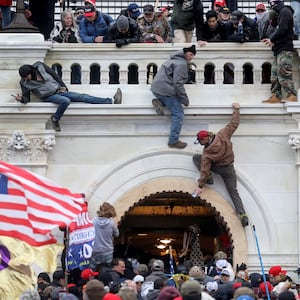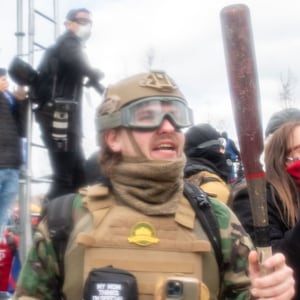Watching TV coverage of a violent mob of Trump supporters breach the Capitol just a 20-minute walk from her home, Rebecca Groom felt deeply unsafe.
“I was watching something that symbolically, and in a practical sense, shows a major breakdown in our government that leaves us vulnerable,” she told The Daily Beast. “I was like, okay, we could be witnessing assassinations in a second. So I decided to get in the car at that point.”
The Capitol Hill resident and Air Force veteran drove across a bridge to Virginia and waited out the rest of the attack at a friend’s parents’ house. But a week later, it wasn’t the lack of security that made Groom decide to buy a one-way ticket to Boston to hang out with a friend rather than stay here through the inauguration of President-elect Joe Biden.
ADVERTISEMENT
It was the abundance of it.
As virtually all of downtown Washington, D.C., is locked down behind layers of fences, Secret Service security checkpoints, and National Guard roadblocks, Groom is one of many residents worried that if another violent protest does erupt, it will be pushed into the outlying neighborhoods because the mob won’t be able to get near the event they’re trying to protest.
“If they can’t get close to the Capitol to protest in a march, I don’t know where they march,” she said. “They could come in from the surrounding areas, just traipsing through my neighborhood.”
“Everyone we talk to in DC is only talking about this, right? And there is a cloud of tension and anxiety,” she added.
Residents of a city still scarred and reeling from the Capitol attack earlier this month have been airing similar fears on neighborhood internet message boards, and business owners have appealed to the local government officials who represent them for reassurance.
Already by Sunday, the White House, Capitol, Washington Monument, and National Mall were effectively inaccessible, secured behind high fencing, camouflaged Humvees, and phalanxes of armed military guards. Up to 25,000 troops were expected to arrive in the city by Inauguration Day, and access to Pennsylvania Avenue was limited to only those screened for weapons at several magnetometer-equipped Secret Service checkpoints on the cross streets.
Still, authorities plan to allow two pre-permitted protest groups to amass at separate “First Amendment Zones” along that heavily secured stretch of Pennsylvania Avenue, with a limit of 100 people in each at a time.
That sets off alarm bells for Michael Shenkel, the official who represents the Penn Quarter and Chinatown neighborhoods just north of the checkpoints on the city’s Advisory Neighborhood Commission.
Businesses in the area have already been hard hit, not just by COVID-19 closures but also looting and destruction during protests last year. Although he said he’s grateful for the added security after the horrors of the Capitol attack, Shenkel said he’s heard from more than a few business owners anxious about what might go down just out of view of the checkpoints.
“A concern of mine is that as people come to these protest areas or depart protest areas after they are all amped up, and what they may do coming back into the less secure areas of the city,” Shenkel said. “People are very tense. We don’t know what is to come.”
Some businesses were still operating this weekend, but many had already boarded up their windows—a double hit for restaurants, because Inauguration Day crowds usually mean thousands of potential orders.
Jassi Bindra is the head chef at Punjab Grill, a high-end Indian eatery half a block north of the Trump Hotel. The Secret Service set up a checkpoint entry to Pennsylvania Avenue basically right in front of their door, so he said he feels reasonably confident protesters wouldn’t try to smash up the place. But even though they are only open for pick-up orders anyway because of pandemic restrictions on indoor dining, he said his establishment made a decision to close to make sure anyone coming back and forth from the business wouldn’t be harmed this week.
“You need to walk three blocks to come and pick up and then go,” he said, due to limits on vehicular traffic in the area. “Even the [delivery] drivers who will come, they are putting their life into risk, you know what I mean?... It’s better not to have any life in danger.”
Bindra said he won’t be back until after the inauguration, but he did open his kitchen for an hour on Saturday to cook meals for the National Guardsmen and other security officials nearby.
Much-hyped, nationwide protests at state capitols over the weekend to protest Biden’s ascent to power were mostly tame affairs—when anyone bothered to show up at all. Still, the quiet was not exactly a comforting one.
A smattering of Boogaloos—a loose assemblage of Civil War-thirsty, far-right and libertarian types—were on hand in cities like Columbus, Ohio on Sunday. In Minnesota, a rally on Saturday saw just a dozen Pro-Trump protesters gathered at the State Capitol amist a heavy police presence, with National Guard Humvees parked at the entry points and State Troopers lining the perimeter and walkways. The journalist to protester ratio was at least 3-1, and only grew bigger on Sunday, when a handful of Trump supporters turned up for a prayer service.
Reports indicated that the FBI believed there was a “credible threat,” of violence from Boogaloos in states like Minnesota and Michigan. But Becky Stohmeir, an organizer with Hold The Line, a group that has been protesting at the Minnesota State Capitol every weekend since the election, said that fear of violence as well as quickly spreading rumors of "false flag" attacks had kept some of her group’s members away. The Daily Beast previously reported some far-right voices were warning rallies this week were some kind of trap to ensnare activists in the hands of law enforcement.
“As you can tell from today, a lot of people are scared to come out here,” Stohmeir, whose group held a “Storm the Capitol” event in Minnesota on Jan. 6, the same day as the Capitol Riot, told The Daily Beast. “People start talking about false flags and, you know, dangerous, violent situations, and it just magically gets everyone to stay home.”
An annual, pro-gun rally in Richmond on Monday was also a relatively tame affair, with law-enforcement and media reportedly outnumbering protesters at some points.
Likewise, thanks to the show of force, some in Washington were sanguine in the face of potential danger.
Robert Pohl, a tour guide and blogger who lives on Capitol Hill, said he thought that the secured area was so large it’ll actually make it harder for a mob to form. So he’ll be defiantly staying put in his home, he said.
“I’m not leaving the Hill until after inauguration, but I’m also not leaving the Hill. I mean, there’s some people that have just left, but you know, it’s my home. I want to stay here,” he said. “I’m 90 percent certain that nothing's going to happen.”
At the same time, that 10 percent nags at him a bit, he conceded. As the normal noise of traffic, tourists, and pedestrians has been erased from the once busy streets, an eerie calm has set in—one Pohl hopes won’t be a calm before the storm.
“The likelihood that something happens to me personally or to my [family], you know, is extremely low. That’s a good thing. But that uncertainty is not good,” he said. “I don’t quite trust the calm.”
—With reporting by Jared Goyette from St. Paul








